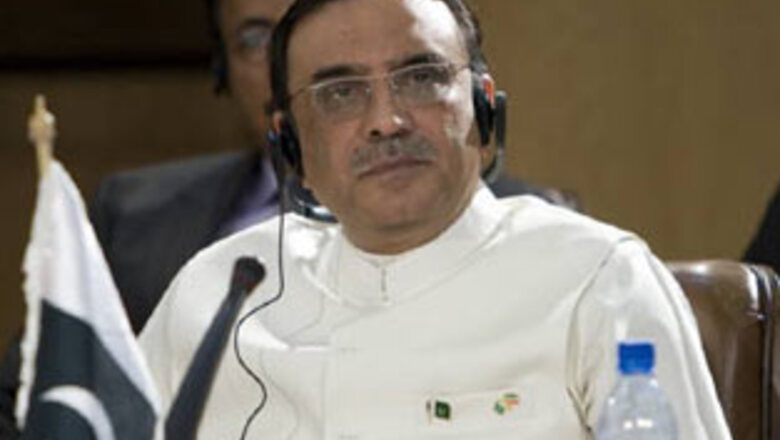
views
Islamabad: Pakistan's Supreme Court on Monday took up legal challenges to a controversial amnesty decree which, if knocked down, could trigger political turmoil for embattled President Asif Ali Zardari.
The court has yet to rule whether the amnesty, granted to thousands of people, including Zardari and several government figures, against corruption and other charges is still valid after it lapsed last week.
Zardari, widower of assassinated former prime minster Benazir Bhutto, cannot be prosecuted because of presidential immunity.
But criminal cases could be re-opened against government officials, including the interior and defence ministers, if the court strikes down the 2007 decree.
The re-opening of politically charged cases could further weaken the increasingly unpopular president as the opposition steps up demands for government figures protected by the decree to resign.
Political wrangling would dismay the United States as it would divert attention in its nuclear-armed ally from the fight against al Qaeda and Taliban militants at a time when President Barack Obama's administration is struggling to stabilise neighbouring Afghanistan.
The government last month was forced to abandon plans to get parliamentary approval for the amnesty in the face of objections from a coalition partner and the opposition.
"This is a law of the jungle," Qazi Hussain Ahmed, an Islamist party opposition leader, told reporters outside the court. The hearing is likely to last for weeks.
In the face of widespread opposition to the amnesty, a government lawyer told the Supreme Court the government would not attempt to defend it.
Chief Justice Iftikhar Chaudhry, who is heading a 17-judge panel hearing the challenges, ordered the government to provide the court with full details of those who were protected by the amnesty on Tuesday. The case was then adjourned.
CHALLENGES AHEAD
Zardari has been dogged by corruption accusations stemming from his wife's two terms as prime minister in the 1990s. He was never convicted and said the charges were politically motivated.
The amnesty was introduced by former president Pervez Musharraf under a plan to bring Bhutto back from self-imposed exile under a power-sharing pact.
Bhutto returned in October 2007, weeks after Musharraf introduced the amnesty, but she was assassinated weeks later.
Zardari led her party to victory in an election in February 2008 and become president after Musharraf's resigned that August.
Zardari, who is seen as close to the United States and who has overseen an intensification of action against Islamist militants, has faced challenges to his authority and analysts say he is likely to face more.
In March, he was forced to restore dozens of judges sacked by Musharraf after the main opposition leader, former prime minister Nawaz Sharif, led thousands of protesters towards the capital.
In October, he opened a rift with the powerful military by defending a US aid package.
The army, which has ruled Pakistan for more than half of its history, expressed "serious concern" about conditions that critics said violated sovereignty.
Zardari's fall does not appear imminent, despite his unpopularity.
But analysts say his opponents, buoyed by his differences with the army, could intensify pressure on him to shed the sweeping powers his predecessor accrued and transfer them back to the prime minister. Shedding the power to sack a government and appoint military chiefs would turn Zardari into a figurehead.
Zardari's aides say he is committed to giving up the powers, as illustrated last week by the transfer of authority over the country's nuclear weapons to the prime minister. Despite that, critics say Zardari is determined to retain the powers.




















Comments
0 comment